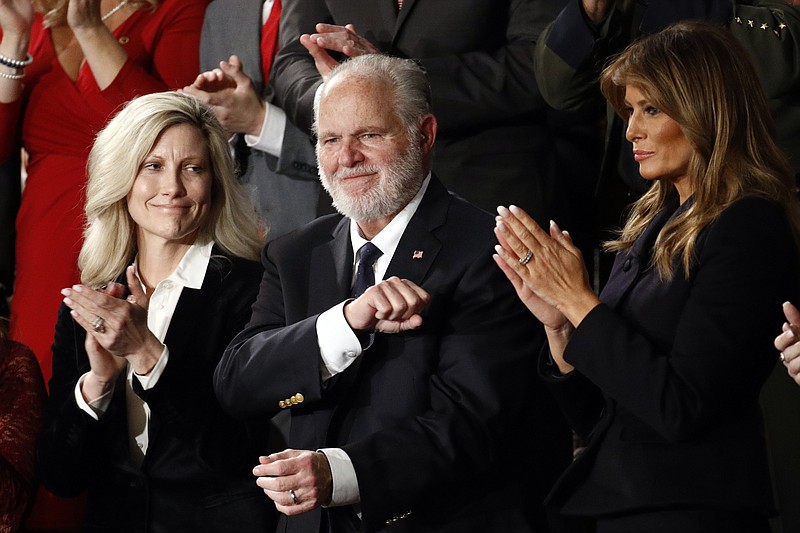NEW YORK (AP) - You didn't have to like or even listen to Rush Limbaugh to be affected by what he did.
Conservative talk radio wasn't a genre before him. Without Limbaugh, it's hard to imagine a Fox News Channel or a media landscape defined by shouters of all stripes that reflect and influence a state of political gridlock.
To his fans, Limbaugh's Wednesday death of lung cancer at the age of 70 was an occasion for deep mourning. Somewhere, Rush could surely appreciate it.
He left a legacy.
"He was the most important individual media figure of the last four decades," said Ian Reifowitz, professor of historical studies at the State University of New York and author of "The Tribalization of Politics: How Rush Limbaugh's Race-Baiting Rhetoric on the Obama Presidency Paved the Way for Trump."
That assessment was freely offered even though Reifowitz, as the title of his book suggests, isn't a fan. He blames Limbaugh for setting a blueprint for white identity politics and the dividing of the nation into uneasy tribes.
Limbaugh's death led Trump to call in to Fox News Channel for his first television interview since leaving office - and he did it twice.
Former Vice President Mike Pence told Fox he was inspired by Limbaugh to become a talk radio host, which launched his political career. Former White House press secretary Kayleigh McEnany reminisced about riding as a child in her father's pick-up truck as Limbaugh's show played on the radio.
"I am the definition of a 'Rush baby,' and it's not just me," McEnany tweeted. "There are tens of thousands of us all across the conservative movement."
Radio hosts talked politics before Limbaugh, men like Jerry Williams in Boston and Barry Farber in New York.
However, the idea of conservative talk radio didn't take hold until Limbaugh, after bouncing through DJ jobs in Pittsburgh, Kansas City and Sacramento, went national from a perch at New York's WABC in 1988, said Michael Harrison, publisher of Talkers magazine.
Limbaugh was a sensation among people who liked to bother liberals. Before Limbaugh, only 30-40 stations did "talk radio," and many weren't political, Harrison said. Now, there are thousands.
To the end, Limbaugh led the field. He reached an estimated 15.5 million people each week and lost in the ratings for three months only once in some three decades, to advice host Laura Schlessinger, Harrison said. Bumper stickers proclaimed, "Rush is Right."
"There is no talk radio as we know it without Rush Limbaugh. It just doesn't exist," said Sean Hannity, who has 15 million radio listeners beyond his Fox News Channel show. "And I'd even make the argument in many ways: there's no Fox News or even some of these other opinionated cable networks."
Rupert Murdoch and Roger Ailes launched Fox News in 1996. MSNBC started the same year.
Politics seemed second to entertainment in Limbaugh's early years.
"I'm trying to attract the largest audience I can and hold it for as long as I can so that I can charge advertisers confiscatory advertising rates," Limbaugh told Steve Kroft of "60 Minutes" in 1991. "This is a business."
However, he soon became more than a business leader. Republicans credited Limbaugh for helping them win the House majority in 1994.
"It wasn't just that he transformed the media landscape, but he transformed the Republican Party," said Nicole Hemmer, author of "Messengers of the Right: Conservative Media and the Transformation of American Politics." "He became a power player and someone who could move voters."
Conservative radio host Mark Levin called Limbaugh "a tremendous patriot."
"He refused to accept the attacks that came against this country from within," Levin said on Fox News. "He refused to accept the ideological changes in this country. He defended the traditions of this country. And he spoke for tens of millions of us."
To SUNY's Reifowitz, Limbaugh led the way in getting people "scared about the browning of the country."
Limbaugh didn't embrace Trump right away, but soon fell in line. Trump's appeal mystified many in politics at first, but "if you had been listening to Rush Limbaugh for 20 years, he sounded very familiar," Hemmer said.
As Limbaugh's political strength became evident, many Republican politicians felt they couldn't cross him, or run the risk of alienating his millions of listeners, Hemmer said.
"Many of these listeners didn't care if Rush Limbaugh crossed the line (of propriety)," she said. "They cared more about loyalty to him than any kind of underlying set of principles."

